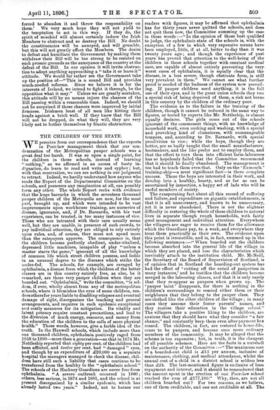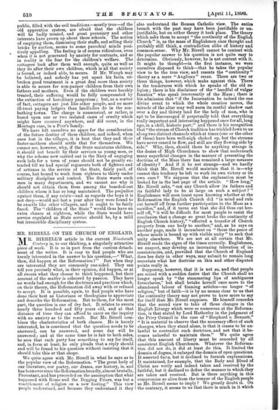THE CHILDREN OF THE STATE.
WE perceive from our correspondence that the experts in Poor-law management think that our con- demnation of the Metropolitan pauper schools was a great deal too harsh. It was so upon a single point, for the children in those schools, instead of learning "nothing," as we affirmed in an access of hasty in- d;gnation, do learn to read and write and cypher; but, with that reservation, we can see nothing in our judgment to retract. Indeed, we hardly understand how anyone who reads the Report of the Departmental Committee on the schools, and possesses any imagination at all, can possibly form any other. The whole Report reeks with evidence that the huge barracks in which the seventeen thousand pauper children of the Metropolis are now, for the most part, brought up, and which were intended to be vast improvements upon workhouse training, are nurseries of disease, ignorance, and, if Dr. Barnardo, with his vast experience, can be trusted, in too many instances of vice. Those who are intrusted with their care usually mean well, but they are unable, in presence of such crowds, to pay individual attention, they are obliged to rely entirely upon rules, and, of course, they must not spend more than the ratepayers approve. The consequence is, that the children become perfectly obedient, under-vitalised, depressed little machines, incapable of play "unless a master starts the game," ignorant of all the knowledge of common life which street children possess, and liable in an unusual degree to the diseases which strike the under-fed. The schools, for example, are ravaged by ophthalmia, a disease from which the children of the better classes are in this country entirely free, as also, be it remarked, are these very pauper children when they are boarded out. "Ophthalmia," write the committee, "is sel- dom, if ever, wholly absent from any of the metropolitan schools, where it blemishes the eyes of some children, ren- dere othersfor years liable to disabling relapses and eventual damage of sight, disorganises the teaching and general arrangements, and requires in each epidemic exceptional and costly measures for its mitigation. Its vitality and latent potency require constant precautions, and lead to the diversion of much energy, resource, and money from the education of the children to the calls of mere physical health." Those words, however, give a feeble idea of the truth. In the Hanwell schools, which include more than one thousand children, ophthalmia positively raged from 1858 to 1890—more than a generation—so that in 1874 Mr. Nettleship reported that eighty percent. of the children had been afflicted, and twelve per cent. had " damaged " eyes, and though by an expenditure of £20,000 on a separate hospital the managers managed to check the disease, chil- dren have still such a liability that cases continue to be transferred from the healthy to the "ophthalmic school." The schools of the Hackney Guardians are never free from ophthalmia. "A severe outbreak occurred in 1860; others, less serious, in 1874 and 1881, and the school is at present disorganised by a similar epidemic, which has already lasted two years." Indeed, not to harass our readers with figures, it may be affirmed that ophthalmia has for thirty years never quitted the schools, and does not quit them now, the Committee summing up the case in these words :—" In the opinion of those best qualified to judge, the ophthalmic state of the schools is, with the exception of a few in which very expensive means have been employed, little, if at all, better to-day than it was twenty years ago ; and though the experience of past years has proved that attention to the well-being of the children in these schools together with constant medical' care, are capable of almost entirely preventing the very. worst cases of ophthalmia, it is equally clear that the disease, in a less severe, though obstinate form, is still very prevalent in them." We cannot see what further proof is needed of the badness of the system now prevail- ing. If pauper children need anything, it is the full use of their eyes, and in the great union schools they run a special risk of being deprived of them, a risk not borne in this country by the children of the ordinary poor.
The evidence as to the failure in the training of the children, though it cannot be reduced in the same way to figures, or tested by experts like Mr. Nettleship, is almost equally decisive. The girls come out of the schools ignorant of the commonest things, with no knowledge of household work, even cooking and washing, with a special and provoking kind of clumsiness, with unmanageable tempers, and, according to Dr. Barnard°, with special proclivities to vice; while the boys, though they are better, are so badly taught that the small manufacturers, bootmakers, and the like prefer not to employ them, and that the effort to turn them into efficient farm-labourers has so hopelessly failed that the Committee recommend that it should be finally abandoned. The management is too bad to teach them even that. Only on the 'Exmouth training-ship—a most significant fact—is there complete success. There the boys are interested in their work, and develop into a healthy, hearty, and as far as can be ascertained by inspection, a happy set of lads who will be useful members of society.
The exasperating fact about all this record of suffering and failure, and expenditure on gigantic establishments, is that it. is all unnecessary, and known to be unnecessary, yet it is never abandoned. There is not the slightest difficulty in restoring the whole of these children to natural lives in separate though rough households, with fairly good management and individual attention. Everywhere the villagers are eager to receive them for the allowance which the Guardians pay, 4s. a week, and everywhere they treat them practically as their own. The evidence upon this point is irresistible, and is, in fact, summed up in the following sentences :—" When boarded out the children become absorbed into the general life of the village in which they are placed, and lose the characteristics which inevitably attach to the institution child. Mr. McNeill, the Secretary of the Board of Supervision of Scotland, is of opinion that in Scotland the boarding-out system has had the effect of cutting off the entail of pauperism in many instances,' and he testifies that the children become merged in the labouring classes, and that it is only rarely that they re-appear as paupers when grown up. The pauper taint' disappears, for there is nothing in the children's surroundings to remind either them or their neighbours that they belong to the pauper class. They are clothed like the other children of the village ; in many cases they assume their foster parents' names, and they receive their education in the village school." The villagers take a positive liking to the children, aro anxious that they should have what they consider "a fair chance," and constantly keep them even after payment has ceased. The children, in fact, are restored to home-life, cease to be paupers, and become once more ordinary members of the community. It may be alleged that the scheme is too expensive ; but, in truth, it is the cheapest of all possible schemes. Here are the facts in a nutshell on the authority of the Committee :—" The maximum cost of a boarded-out child is £13 per annum, inclusive of maintenance, clothing, and medical attendance, whilst the annual cost of a child in a district school is seldom less than £24. The last-mentioned figure is exclusive of loan repayment and interest, and it should be remembered that the amount spent in the erection of one Poor-law school reached the sum of £177,100." Why, then, are not all children boarded out ? For two reasons, as we believe, one of them creditable, and one not creditable at all. The public, filled with the evil traditions—mostly true—of the old apprentice system, are afraid that the children will be badly treated, and great pecuniary and other interests have grown up about these schools. The notion of emptying them, dismissing their staffs, and selling their bricks by auction, seems to some parochial minds posi- tively appalling. The feeling is of course ridiculous, even when it is not generated by anxiety for contracts, and so in reality is the fear for the children's welfare. The cottagers look after them well enough, quite as well as they do after their own children, which is all that society is bound, or indeed able, to secure. If Mr. Waugh may be believed, and nobody has yet upset his facts, un- broken good treatment is a great deal more than society is able to secure for non-pauper children from their own fathers and mothers. Even if the children were harshly treated, their suffering would be fully compensated by the extinction of hereditary pauperism ; but, as a matter of fact, cottagers are just like other people, and no more ill-treat paying lodgers than landladies do in the sea- bathing towns. The charge is nonsensical, or rather, is based upon one or two isolated cases of cruelty which might have occurred anywhere, and did occur, in the Montagu case, in a Peer's family. We have left ourselves no space for the consideration a the future destiny of these children, and indeed, when once lost in the villages, it is best that they and their foster-mothers should settle that for themselves. We cannot see, however, why, if the State maintains children, it should not benefit by their services as young men, or why the scheme now carried out in the Navy of engaging such lads for a term of years should not be greatly ex- tended till we had special regiments both of fighters and of artisans in the service of the State, fairly paid, of course, but bound to work from eighteen to thirty under military discipline and control. The State wants such men in many departments, and we cannot see why it should not obtain them from among the boarded-out children whom it has so long maintained. The prejudice against them, if any exists—and as regards the boys it is not deep—would not last a year after they were found to be exactly like other villagers, and it ought to be fairly faced. The "children of the State" would thus have an extra chance at eighteen, while the State would have service regulated as State service should be, by a mild but irresistible disciplinary system.



































 Previous page
Previous page